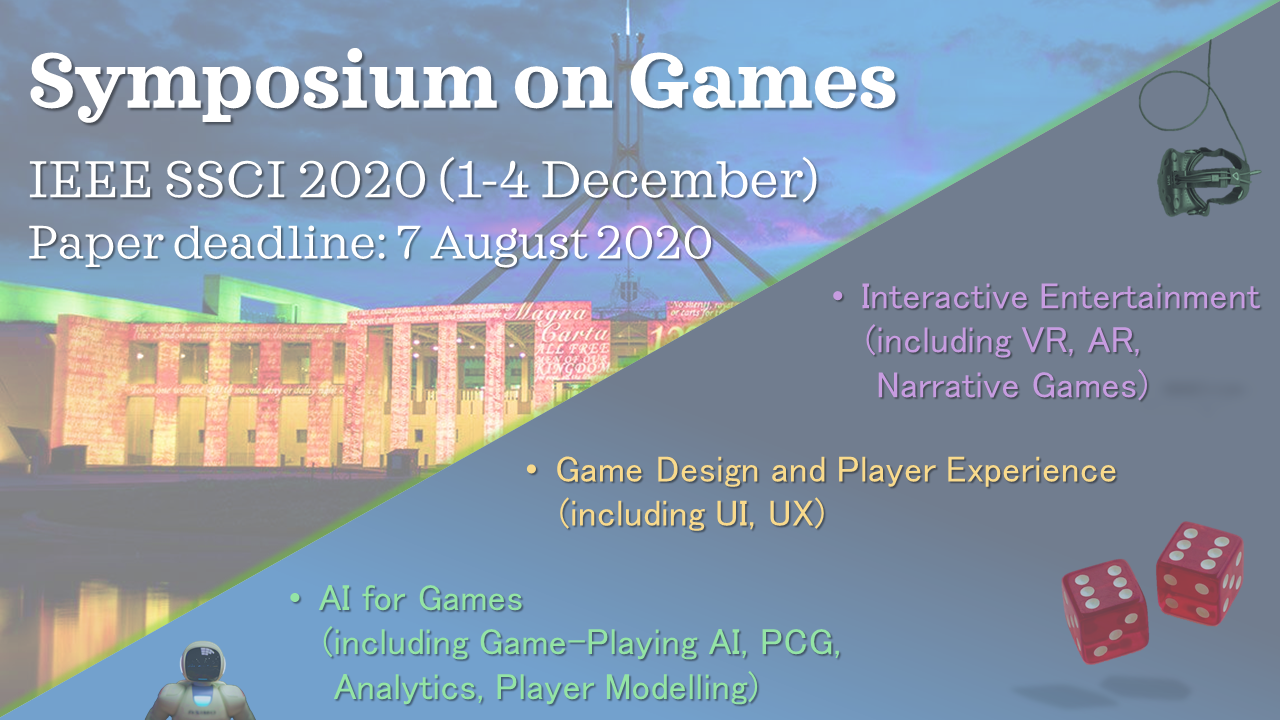Symposium on Games @ IEEE SSCI 2020
1-4 December 2020, Canberra, Australia Online
This symposium is organized in association with the IEEE Computational Intelligence Society (CIS) Games Technical Committee (GTC).
News
Paper submission deadline passed! Thank you for all the submissions received! Notifications will be sent out September 18th.
COVID-19: IEEE SSCI 2020 (and the Symposium on Games) will be running ONLINE in December with reduced registration costs. Follow further updates on the main conference page: IEEE SSCI 2020.
Aim
Games are an ideal domain to study computational intelligence (CI) methods, as they provide affordable, competitive, dynamic, reproducible environments suitable for testing new search algorithms, pattern-based evaluation methods, or learning concepts. Games scale from simple problems for developing algorithms to incredibly hard problems for testing algorithms to the limit. They are also interesting to observe, fun to play, and very attractive to students. Additionally, there is great potential for CI methods to improve the design and development of both computer games as well as tabletop games, board games, and puzzles. This symposium aims at gathering leaders and neophytes in games research, as well as practitioners in this field who research applications of computational intelligence methods to computer games.
Scope
In general, papers are welcome that consider all kinds of methods (evolutionary computation, supervised learning, unsupervised learning, fuzzy systems, game-tree search, rolling horizon algorithms, MCTS, etc.) applied to games (card games, board games, mathematical games, action games, strategy games, role-playing games, arcade games, serious games, etc.).
Examples include but are not limited to:
- Adaptation in games
- Automatic game testing
- Coevolution in games
- Comparative studies (e.g. CI versus human-designed players)
- Dynamic difficulty in games
- Games as testbeds for algorithms
- Human player imitation
- Team AI
- Learning to play games
- Multi-agent and multi-strategy learning
- Player/opponent modelling
- Procedural content generation
- CI for serious games (e.g., games for health care, education or training)
- Results of game-based CI and open competitions
- Game AI for real-world decision making and planning
Important Dates & Submission
In the submission server, make sure you select GAME: IEEE Symposium on Games as the "Main research topic" (and one of the 3 sub-topics included which is most related to your submission).Organizers

Raluca D. Gaina, r.d.gaina@qmul.ac.uk, web
PhD student, Game AI Research Group, School of Electronic Engineering and Computer Science, Queen Mary University of London, UK
Bio: Raluca is currently studying for her Ph.D. in Intelligent Games and Games Intelligence at Queen Mary University of London, in the area of rolling horizon evolution in general video game playing, after completing a B.Sc. and M.Sc. in Computer Games at the University of Essex. In 2018, she did a 3 month internship at Microsoft Research Cambridge, working on the Multi-Agent Reinforcement Learning in Malmo Competition (MARLO). She was the track organiser of the Two-Player General Video Game AI Competition (GVGAI) 2016-2019 and is the Vice-Chair of the IEEE CIS Games Technical Committee in 2020. Her research interests include general video game playing AI, reinforcement learning and evolutionary computation algorithms.

Mike Preuss, m.preuss@liacs.leidenuniv.nl
Assistant Professor at LIACS, Dept. of Computer Science, Leiden University, The Netherlands
Bio: Mike received his PhD in 2013 from the Chair of Algorithm Engineering at TU Dortmund, Germany, and was with ERCIS at the WWU Muenster, Germany, from 2013 to 2018. His research interests focus on the field of evolutionary algorithms for real-valued problems, namely on multi-modal and multi-objective optimization, and on computational intelligence and machine learning methods for computer games. Recently, he is also involved in Social Media Computing, and he is publications chair of the upcoming multi-disciplinary MISDOOM conference 2020. He is associate editor of the IEEE ToG journal and has been member of the organizational team of several conferences in the last years, in various functions, as general co-chair, proceedings chair, competition chair, workshops chair.

Jialin Liu, liujl@sustech.edu.cn, web
Research Assistant Professor, Dept. of Computer Science and Engineering, Southern University of Science and Technology, China
Bio: I'm a Research Assistant Professor at the Department of Computer Science and Engineering of Southern University of Science and Technology (SUSTech), China. Before joining SUSTech, I was a Postdoctoral Research Associate at Queen Mary University of London (QMUL, UK) and one of the founding members of the Game AI research group created in August 2017. I received my Ph.D. Degree in Computer Science from the Inria Saclay and the Université Paris-Saclay (France) in December 2015 and a Master degree in Bioinformatics and Biostatistics from the École Polytechnique and the Université Paris-Sud (France) in 2013. My research interests include, but not limited to the following areas: game AI (AI for playing games, AI for designing games), noisy optimisation (derivation-free optimisation, dynamic resampling strategies), meta-heuristics and algorithm portfolio.
